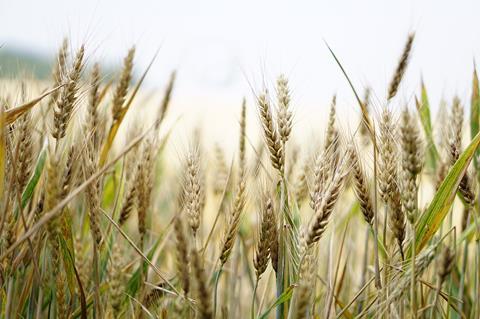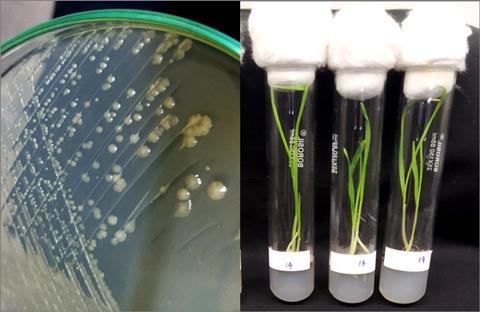A bacterial strain isolated from agricultural soil in India can help crops to thrive in chilly conditions by promoting seed germination and growth, a new study shows.
A team of scientists, from CSIR-Institute of Himalayan Bioresource Technology (CSIR-IHBT), revealed their discovery in a paper, ‘Acinetobacter oleivorans IRS14 alleviates cold stress in wheat by regulating physiological and biochemical factors’, which has been accepted for the Journal of Applied Microbiology, an Applied Microbiology International publication.

In regions with extremely cold climates, agriculture faces significant challenges due to hostile environmental conditions and traditional crop cultivation methods often show limited food production and increase food insecurity.
In order to address this problem, the researchers focused on harnessing the potential of cold-adapted Plant Growth-Promoting Rhizobacteria (PGPR) to enhance crop productivity in these extremely cold environments.
Eco-friendly
“Indigenous Plant Growth-Promoting Rhizobacteria (PGPR) are a very important part of sustainable agriculture, offering a natural and eco-friendly means to enhance crop productivity,” said Dr Rakshak Kumar.
PROMOTED: AMI has teamed up with QIAGEN to help you get the highest yields from your DNA Extractions. Get your free guide here.
“These PGPR strains have evolved alongside specific plant species, forming unique symbiotic relationships. They are advantageous over non-native counterparts because of their high adaptability to local environmental conditions.
“They promote overall plant health and growth by aiding nutrient uptake, suppressing pathogenic microorganisms, and improving soil structure. Additionally, their use reduces the need for synthetic fertilizers and pesticides, thus minimizing environmental impact and decreasing production costs.”
Wheat rhizosphere
Because the potential of indigenous PGPR holds great promise for sustainable agricultural practices worldwide, the research team decided to explore indigenous bacteria of the wheat rhizosphere for their growth enhancement under cold conditions.
“Our primary objective is to investigate the indigenous strain Acinetobacter oleivorans IRS14 for the improvement of crop yield and overall health of wheat plants,” said Dr Kumar.
“We aim to discover the mechanisms through which cold-adapted PGPR interacts with plants to promote growth and increase tolerance to cold stress. By addressing this critical issue, we hope to provide a sustainable approach for agriculture in cold climates.”
READ MORE: Special issue on Agriculture & the Rhizosphere
The team were able to isolate a novel psychrotroph strain of Acinetobacter oleivorans IRS14 from the rhizosphere of the wheat growing in farmland located in Palampur, Himachal Pradesh, India. The isolated strain regulates wheat plants’ physio-biochemical factors and metabolic pathways, stimulating their proper growth and development under chilling stress.
Screening isolates
“We selected forty-five rhizobacterial isolates for screening to identify those with plant growth-promoting and cold stress-tolerating properties,” said Dr Kumar.
“Among these isolates, we focused on the multifarious psychrotrophic strain IRS14, which we inoculated onto wheat seeds. These seeds were then cultivated under the cold temperature of 6±2°C. Our aim was to assess the potential of the PGPR strain IRS14 in mitigating the adverse effects of chilling stress on wheat plants.
“To understand the mechanisms underlying cold stress alleviation, we conducted genetic, biochemical, physiological, and molecular analyses of both the bacterium and the plants. Our research revealed that IRS14 significantly promoted seed germination and the growth of wheat under chilling stress.
Germination boost
“We observed that an increase in proline concentration and enhanced antioxidant activity effectively improved seed germination. Furthermore, the colonization of IRS14 in plant roots resulted in various beneficial effects, including the production of hormones such as Jasmonic Acid, Abscisic acid, and Zeatin, as well as plant growth-promoting traits like ACC deaminase, phosphate solubilization, nitrogen fixation, potassium solubilization, siderophore production, and indole acetic acid.”

The interaction between IRS14 and the wheat plants also stimulated an increase in proline content, the hormone IAA (Indole-3-acetic acid), kinetin, and brassinolide in wheat plants, all of which were correlated with higher carotenoid levels, Dr Kumar said.
“The level of antioxidants was also enhanced, indicating the Reactive Oxygen Species (ROS) and free radical scavenging activity, ultimately reducing chilling stress and promoting the growth of wheat plants. This discovery holds significant promise for improving crop productivity in cold climates and advancing sustainable agricultural practices.”
Low temperatures
The PGPR activity demonstrated by Acinetobacter oleivorans IRS14 at temperatures as low as 6°C ± 2°C was a truly significant discovery.
“Unlike the majority of PGPRs, this strain not only manages to survive but also actively promotes plant growth under chilly conditions,” Dr Kumar said.
“Genetic investigations into IRS14 have revealed the presence of several genes that are entirely unique to this strain. Among these unique genes, approximately 6.13% play a crucial role in the process of competitive exclusion, including bacterial fitness, biofilm formation, and cell envelope remodeling.
“Additionally, around 5.21% of these unique genes contribute to the process of root colonization, including functions such as surface attachment, utilization of plant-derived substrates, and pilin secretion. The overall adaptability displayed by IRS14 offers a ray of hope for agriculture in cold climates, where chilling stress limits crop production.”
Ray of hope
This work offers a ray of hope for cold-affected regions with low agriculture yields, Dr Kumar said.
“By enhancing seed germination and promoting wheat growth under chilling stress, IRS14 presents a sustainable approach to the problem of cold stress in farming. Not only does it provide a means to increase crop productivity and food security in cold-prone regions, but it also reduces dependence on chemical fertilizers, thus presenting an eco-friendly solution to farmers in cold environmental conditions.”
The strain IRS14 could be utilized to develop a low-cost biofertilizer, decreasing the reliance of the farmers on chemical fertilizers and providing an eco-friendly method to improve the growth and development of plants under cold-stress conditions.
“Advanced omics technologies should be employed to gain deeper insights into PGPR mechanisms and their effects on plant health to optimize their use. Moreover, large-scale and long-term field trials across diverse agricultural conditions are needed to assess PGPR’s real-world impact comprehensively,” Dr Kumar said.
The study is led by Ashif Ali and Kiran Dindhoria working with Dr. Rakshak Kumar, Senior Scientist at CSIR-IHBT, Palampur, Himachal Pradesh. It is financially supported by the Council of Scientific and Industrial Research, Govt. of India, under the Fast Track Commercialization project (4th Tranche of E3OW; MLP0182), and the Department of Science and Technology, Govt. of India under DST-WMT project (DST/TDT/WM/2019/43).
‘Acinetobacter oleivorans IRS14 alleviates cold stress in wheat by regulating physiological and biochemical factors’, appears in the Journal of Applied Microbiology, an Applied Microbiology International publication.
Topics
- Abscisic acid
- Acinetobacter oleivorans
- Agriculture
- Applied Microbiology International
- Ashif Ali
- Asia & Oceania
- Community
- CSIR-Institute of Himalayan Bioresource Technology
- Economic Equality
- Healthy Land
- Jasmonic Acid
- Kiran Dindhoria
- New nitrogen-fixing bacteria for sustainable agriculture
- plant growth-promoting rhizobacteria
- Rakshak Kumar
- Research News
- Soil & Plant Science
- wheat
- World Soil Day
- Zeatin




No comments yet